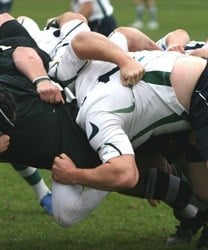
Top stories






More news


Marketing & Media
Ads are coming to AI. Does that really have to be such a bad thing?














Dr Brown's thesis evaluates the effectiveness of the BokSmart programme, a nationwide injury-prevention programme for rugby launched in 2009 by the South African Rugby Union (SARU). Ultimately, the programme aims to reduce the incidence of rugby-related catastrophic head and neck injuries in South Africa.
The thesis evaluation uses both quantitative and qualitative methods to investigate not only catastrophic injury rates over time, but also player behaviour and coach and referee perceptions of the programme.
Through his research Dr Brown, who graduated with a doctorate in Exercise Science from UCT's Science faculty on 20 December 2014, found that the scrum engagement sequence in rugby was dangerous and needed to be adapted to improve the safety of the players. Dr Brown's research helped to contribute to a new "crouch, bind, set" sequence in rugby when setting the scrum, as opposed to the previous "crouch, touch, set" sequence.
SARU first announced this change in the school and amateur rugby level in 2013.
Dr Brown said: "The rest of the world followed SARU's lead six months later."
Based on Dr Brown and his team's identification of the most common injuries at the annual SARU youth weeks, the SARU medical department also drafted a "minimum safety standards" document to make medical support teams aware of the most likely injuries and how many they may need to deal with in a day.
"Together with SARU's medical department, we developed a general rule to allocate the number of medical doctors to tournaments based on the number of serious injuries per match. This seemed to increase with the age of the attendees at the tournament, so that the under-13 tournament had the least serious injuries, and under-18 had the most serious."
Dr Brown's research found that BokSmart was able to reduce catastrophic injuries in junior (schoolboy) but not senior (adult) players after its launch. The study also found that player behaviour had improved over this period. However, Dr Brown said that although there was widespread positive response towards the programme, some coaches from high socioeconomic-status teams felt that the programme was a waste of their time as they perceived the risk of catastrophic injury to their teams to be negligible.
Dr Brown obtained his BSc in Biochemistry and Physiology before obtaining his BSc(Med)(Hons) and MSc(Med) in Exercise Science from UCT. His PhD thesis was a joint project between UCT and VU University in Amsterdam, The Netherlands.